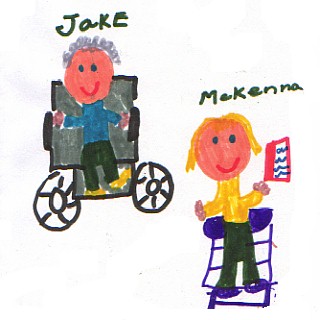 Blue at Gimp Parade recently posted about a positive stranger encounter: a mother who was graceful enough to respect both Blue's privacy and her own child's curiosity about disability. It reminds me that I wrote up an essay called "Talking to Preschoolers about Disability" when my daughter was in preschool and her friends were meeting my son. The other parents asked me what they should say about him, when their children asked questions like “why can’t he walk?” These were the tips I gave:
Blue at Gimp Parade recently posted about a positive stranger encounter: a mother who was graceful enough to respect both Blue's privacy and her own child's curiosity about disability. It reminds me that I wrote up an essay called "Talking to Preschoolers about Disability" when my daughter was in preschool and her friends were meeting my son. The other parents asked me what they should say about him, when their children asked questions like “why can’t he walk?” These were the tips I gave:Be reassuring. Preschool children are often empathetic, and they may be upset when they imagine that another child is in pain. Most people with disabilities are not in constant pain, or sad about their disability, so you can reassure the child about this: “He can’t walk yet, but that’s okay. He seems happy, and I know his parents love him--those are the important things.” You may also need to reassure your child that another person’s disability is not contagious -- this is a common fear of children.
Watch your nonverbal cues. Kids are attentive not only to our words but to our behavior. The tone of your voice, the expression on your face, and your body language will tell your child a great deal. Avoid a pitying or hushed tone in discussing disability; smile and relax, so you can convey that you’re comfortable with all different shapes and sizes of people, and you hope they will be, too.
Encourage curiosity. Curiosity is natural in children, and they may stare in their wondering. Telling them “don’t look” sends a message that something is terrible, or embarrassing. Instead, affirm their fascination: “Oh, you’re looking at his blue chair, aren’t you? It’s very interesting. Maybe it helps him sit up so nice and straight. Should we ask him?”
Everybody is different. You may find yourself saying "he's special," but it’s always good to tell your child that she’s special too. You might say, “Everyone is unique in some way; that boy moves differently from most of the children in our class. And you are special because...”
A kid is a kid. It’s also good to emphasize that children with disabilities mostly do the same things as other kids. My son rides the school bus, plays in the park, goes swimming, likes toys and cartoons, celebrates birthdays, and needs to take a bath and go to bed every night, just like other kids. This information may be greeted by a barrage of questions about “how?” Which leads to the last point...
It’s okay to say “I don’t know.” If you don’t know the answers to their questions, say “I don’t know.” This is always better than making up an answer that may confuse or worry the child needlessly. For questions about the future--"Will he ever walk? Will he ever talk?"--it's also truthful to say, "We'll have to wait and see." Because that’s true for all children--what will they do in the future? Nobody knows. We’ll have to wait and see.
[Image above: From a get-well card made for my son by McKenna, a second-grader at Rancho Vista School in Rancho Palos Verdes, CA, in spring 2004--I don't know why she gave him grey curly hair, but otherwise I think it's sweet. --PLR]
These suggestions work well for adults also. Sounds like good advise in every detail.
ReplyDeleteExcellent list. Also, keep the answers simple. Not simplistic, but think before you speak so you don't hem and haw and overqualify so that children lose the thread of your answer.
ReplyDelete